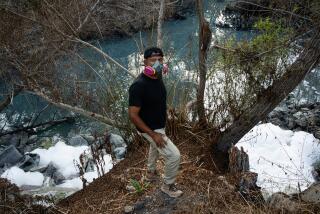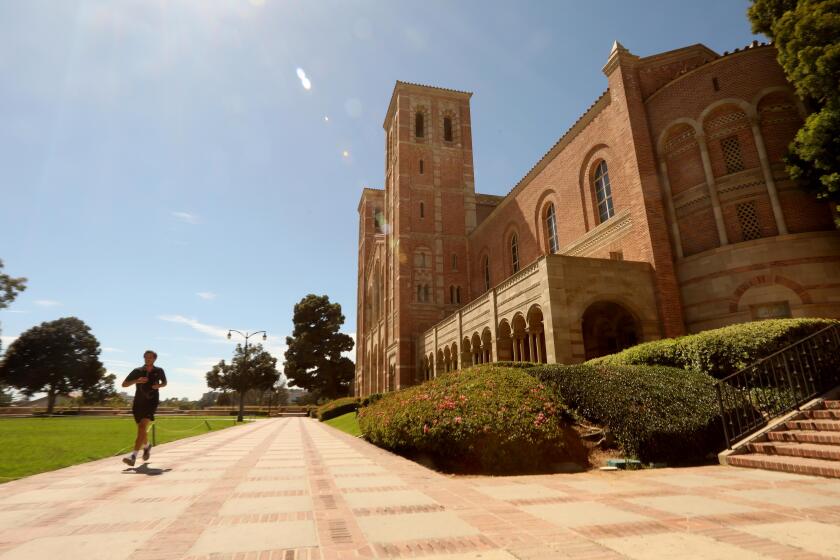Answers Lie Mired in Political Muck
Today I break a long-standing rule that has served me well: Never write about sewage twice in the same week.
Five days ago, I chided Huntington Beach for not being upfront in the summer of 1999 about the extent of its downtown sewer problems--at a time when high bacteria counts resulted in stretches of the beach being closed.
At Monday night’s council meeting, city officials took exception to that column, as well as an editorial and other articles that have appeared in The Times in recent days.
City officials conceded the main point: They should have informed state officials about significant sewer-line leaks in the mid-1990s, but didn’t. However, they insist that all the relevant “players” in beach-closure discussions in 1999 knew about the city’s sewer problems. In other words, Huntington Beach wasn’t holding out while everyone around them was frantically trying to figure out why the ocean had been fouled.
In 1996, a city official estimated that 71,000 gallons of sewage were leaking each day through cracked and broken pipes. City officials now say those figures aren’t reliable and they aren’t sure how to measure the leakage. They concede, however, the problems were significant. Repairs began in 1998, and city officials say they are nearly complete in the downtown area.
After a number of interviews with some of those players Tuesday, I can’t figure out whether I owe the city an apology or not.
Let’s just say the recollections of the various participants are at odds. Not to invoke Watergate, but the nub of the issue seems to be, “What did they know about Huntington Beach’s sewer problems, and when did they know it?”
Huntington Beach spokesman Rich Barnard says Orange County Sanitation District officials and county health officials learned of the extent of the city’s problems between 1996 and 1998. The public--through local cable TV coverage of the council or isolated news stories--also had ways of learning about the situation, Barnard says.
Barnard’s point is that by 1999, when health and sanitation officials were part of the beach-closure discussions, their agencies had been apprised of Huntington Beach’s sewer problems. Plus, he says, city officials discussed it openly at the meetings in which everyone was trying to solve the riddle of what was causing the ocean pollution.
Differing Views
That’s not how others remember it.
“I find it somewhat hard to believe they would make that claim,” says Bruce Paine, an investigator for the state’s Regional Water Quality Control Board. “We had people present at most every meeting of any significance throughout the summer of 1999 . . . Certainly, had [the city] made those present aware of the magnitude of the problem, I don’t see how anybody would have allowed it to be overlooked.”
A representative from the Sanitation District says a Huntington Beach representative raised the sewer-line issue at an August 1999 meeting, but almost as a passing reference.
Charles McGee, one of the lead team members for the Sanitation District, said that was the first he’d heard of Huntington Beach’s sewer problem. He made a “mental note” of it and asked a city official later if he thought the sewer leaks could be contributing to the pollution. The official said he didn’t know, McGee recalls. Without knowing the scope of the problem, McGee arranged for a few tests, and it was determined that the sewer leaks probably weren’t polluting the ocean.
However, says Sanitation District communications manager Lisa Lawson, the magnitude of the city’s sewer problems never were made clear to the other participants. “When it was brought up, it wasn’t quantified,” she says. “I don’t know if it was in discussions [among city officials] in Huntington Beach, but it wasn’t at the these meetings we’re talking about during the summer.”
Barnard identified for me at least three other Sanitation District officials who, he says, knew about the sewer problem before that. Lawson told me she checked with those people and they support McGee’s version.
Huntington Beach officials left the impression Monday night that the sewer leaks have been eliminated as the source of any ocean pollution. However, the state hasn’t ruled them out, Paine says.
Larry Honeybourne is the county Health Care Agency’s program chief for its water quality section. He says there were a “million” meetings that summer of 1999, and he remembers someone bringing up the Huntington Beach sewer problem. He doesn’t recall specifically if the magnitude of the city’s problem was discussed but if it was, he says, it didn’t stick in his mind.
Paine says it’s not confusing to him: The city never “came clean” about the extent of its problems during those 1999 sessions.
Barnard strenuously disputes that, and that’s where things stand.
I don’t know who knew what or when. I have concluded, however, that things aren’t nearly as neat and tidy as Huntington Beach officials described Monday night.
In retrospect, the truest thing said all night may have come from City Manager Ray Silver in responding to a council member’s query as to why the city’s version of events wasn’t getting out.
The city, Silver replied, has “a communications problem.”
*
Dana Parsons’ column appears Wednesday, Friday and Sunday. Readers may reach Parsons by calling (714) 966-7821 or by writing to him at the Times Orange County Edition, 1375 Sunflower Ave., Costa Mesa, CA 92626, or by e-mail to dana.parsons@latimes.com.
More to Read
Sign up for Essential California
The most important California stories and recommendations in your inbox every morning.
You may occasionally receive promotional content from the Los Angeles Times.










